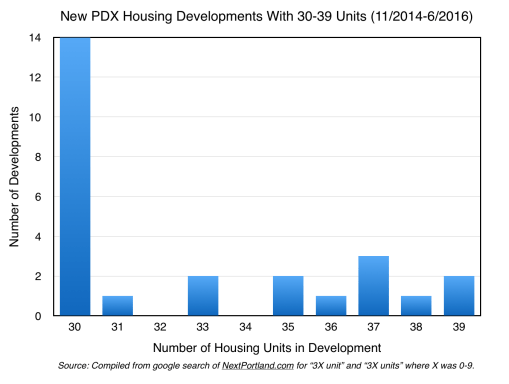
On Wednesday, July 6th at 2PM the Portland City Council will consider a request to require parking for all housing developments with more than 30 homes in the NW Plan District. The request doesn’t come from the Planning and Sustainability Commission (PSC), that body rejected the policy based on concerns it would raise rents and reduce housing supply. Instead, well connected members of the NW Parking Stakeholder Advisory Committee (NW Parking SAC) have lobbied city council in recent months to override the PSC recommendation and impose these new restrictions on future construction.
These parking requirements are not a solution to parking issues in NW Portland. Many high-end developments in NW Portland are built with ample parking, so much parking that the average number of spaces per home in new construction is already higher than the proposed requirements. New regulations would require all developments with 31 homes or more to build parking on-site. If this happens, fewer apartments will be built and they will cost more per-unit to construct.
Portland is experiencing a housing crisis. Thousands of Portlanders are being displaced by higher rents and redevelopment of their existing apartments. In times like this, proposals which curtail the supply of new housing and increase rents should be dead on arrival. A vote for minimum parking requirements is a vote to make the housing crisis worse.
City Council Needs To Hear From YOU
Portlanders who are concerned about housing availability and displacement must let City Council know that this is the wrong solution for this problem. Here is how you can help.
Write to the Commissioners
Send an email to the members of City Council. We suggest you do this by Tuesday July 5th.
Write to Commissioner Steve Novick, Mayor Charlie Hales, Commissioner Nick Fish, Commissioner Dan Saltzman, and Commissioner Amanda Fritz. Let them know that this is the wrong move to make in a housing crisis. Portlanders are looking for leadership and action on housing and will not tolerate steps backward on this issue.
Send testimony to City Council
Before the hearing on Wednesday, July 6th you can send written testimony to cctestimony@portlandoregon.gov. The subject should be “NW Parking Update Project.”
Testify in person at the hearing.
The biggest impact will come from people showing and speaking to council. Council needs to hear from people who face rent increases and displacement due to poor policy such as this. Testifying is easy. Simply state, in your own words, why this issue concerns you and tell council that you want them to reject minimum parking requirements.
July 6th, 2PM @ Portland City Hall
If you plan to testify, please RSVP via this form so we have an idea of what support we can expect.
Spread the Word
We have prepared a fact sheet for your convenience. Tell others who will be affected by this policy change.



